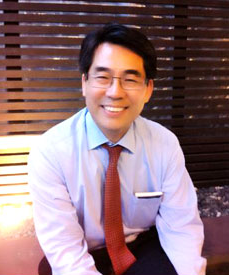Detecting 6 Major Cancers in a Drop of Blood

Professor Cheolwoo Kim has been dedicated for many decades to delivering the most efficient and the least expensive medical services. He founded BIOINFRA in 2001 in an effort to develop a comprehensive and quick system to meet the needs of aging era. Since then he has been researching cancer-screening methods based on biotechnology. Through the research, he succeeded in developing an early cancer diagnosis method, which can detect the 6 major types of cancers only using small amount of blood, by applying the bioinformatics (classification statistics) technology. Lately, he has been focusing on development of new medicine for cancer and a new cancer treatment such as genetic immune therapy.
BIOINFRA Inc. and Prof. Cheolwoo Kim, SNU
BIOINFRA’s Smart Cancer Screening Test (SCST as follows) has demonstrated 85 to 95% of accuracy in detecting 6 major types of cancer, which is dramatically increased accuracy compared to other testing products’ accuracy. This innovative improvement in the accuracy of cancer detection has been made possible by the big data pool, which can analyze multiple protein markers in blood.
As well as detecting cancers, SCST is able to calculate the possibility of cancer development by collecting periodic data of cancer patients or even non-cancer patient. This technology has been highly recognized in Korea and internationally with 8 international registrations, 7 domestic patents and 11 international patents.
Following is the interview with Prof. KIm
Tumor Marker Test (single marker) Vs. Smart Cancer Screening Test (multiple markers & diagnostic algorithm)
Single tumor marker
Multiple markers test (diagnostic algorithm)
- How did you become interested in blood tests for cancer?
As aging and custom-tailored medical services are becoming a widespread trend, one’s burden of medical expenses is increasing. Therefore, I realized the need of more comprehensive and handy diagnostics system other than the old low-efficient and expensive diagnostic systems. Cancer tests using blood sample has been developed and used since many years ago. Moreover, as technological improvement has made it possible to discover multiple biomarkers, the sensitivity (a probability of finding a patient with cancer as having cancer) has been much increased. Moreover, since the test uses blood, which can be easily transported, the convenience and safety of blood tests for cancers can be used more universally and generally.
- What are the advantages of Smart Cancer Screening Test over other conventional tests?
Its biggest merit is the accessibility. Patients don’t need to wait long for the test. It is way quicker and more convenient than CT or endoscopy, even with higher accuracy. Furthermore, it is inexpensive to test all of 6 major cancers and can relieve patients from the high cost of other conventional tests. It is the most cost effective way of cancer screening test. If high-risks of certain cancers are found in the test result, it would recommends to pursue further tests, often more costly and invasive. The most outstanding advantage of this test is that it is a very safe and useful tool to detect cancers in early stage. It doesn’t cause such side-effects as radiation exposure, intestinal bleeding caused by endoscopy or secondary infection. While the conventional cancer diagnosis system can detect only progressive cancers, this test is able to detect early cancer in early stage with high detection rates. Moreover, it can be applied to non-cancer patients’ health management using the periodical tests results and continuous monitoring.
- How did you develop such an innovative technology for 6 major cancers with just a small amount of blood?
In diagnosing cancers, how effectively to use the tools is more important than to decide what tool to use. Tumor marker blood test is one of the effective tools, but the detection rate is only 30 to 40% because it determines positive or negative only depending on a single marker. Our research began as ‘in vitro multi-biomarker test’, which analyzing statistical data and big data pool of over 30 different multi-biomarkers. As a result, by numerically calculating the risk of each 6 major types of cancers, the test more than doubled the diagnosis accuracy compared to other conventional tests. So far it shows 85 to 95% of accuracy in detecting 6 major types of cancers (stomach, lung, liver, colorectal, prostate and breast cancer) with blood samples of cancer patients as well as non-cancer patients.
- What is the ultimate goal of your future research and how to apply the Smart Cancer Screening Test in the future?
The goal is to increase the people’s accessibility to the primary test for cancer easily at lower cost. As U-Healthcare market emerges soon, we are developing a self-diagnosis (Point of Care) kit, which is another effort of us to make our cancer screening system as the most excellent early cancer detection system. In addition to increasing the survival rate of cancer patients, we expect that the early detection of cancers through our system will benefit the medical industry as a whole, through collaborations among hospitals and medical centers.
Inquiry 02-6012-0333
Chanyoung Park, guest reporter